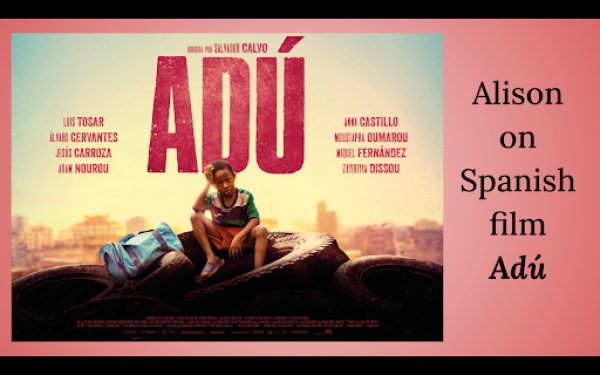11.3.2021: Alison reviews the film Adú (2020)
11.3.2021: Alison reviews the film Adú (2020) Heading link

I recently watched Adú (2020), directed by Salvador Calvo, on Netflix. I decided to watch this film as I did not know much about the struggles African migrants encounter on their venture to Europe. Even though it is a fictional film, I was still interested in gaining some insight into this issue. This film is a culmination of three different storylines that all deal with African immigration to Europe and the struggles that those who go through this encounter. The main storyline centers around Adú, a seven year-old boy, who flees his native Cameroon to attempt to reunite with his father in Spain after their mother is murdered. This film also follows the story of a man, Gonzalo, who is fighting against elephant poachers while dealing with familial strife of his own. Adú also shows the struggles that occur in Melilla, one of Spain’s two autonomous cities in Africa, which is a border town frequently used as a way for immigrants to try to flee to Spain.
I thought that this was an interesting but very upsetting movie to watch. However, it is important to note that there is some reality tied to this film in relation to African immigration to Europe. It is not uncommon for children to have to immigrate on their own to reunite with family after tragedy hits at home. This movie shows children going through events that are unfathomable to me, and I imagine that most people would also share that sentiment, so this was not the easiest movie to watch. I do think it is important for people to understand how difficult immigration is, especially for a child. This film does not sugarcoat anything, which makes for a heart wrenching yet thought-provoking film. Adú does not shy away from showing the traumatizing conditions of immigration, and this film unfortunately does not include a happy ending.
This film is in Spanish, but there are moments in which the characters also speak French, as French is spoken in Cameroon. I found it very helpful to have the subtitles on in Spanish compared to English, because it helps me advance my vocabulary and understand the context well. When the characters were speaking French, I would sometimes switch the subtitles to English as it was easier to read them in English than Spanish while hearing French. I recommend this to anyone who is comfortable reading in and listening to Spanish; if you are just starting out watching Spanish films I would recommend watching this film with English subtitles.
Warning to viewers: rated TV-MA and features graphic content